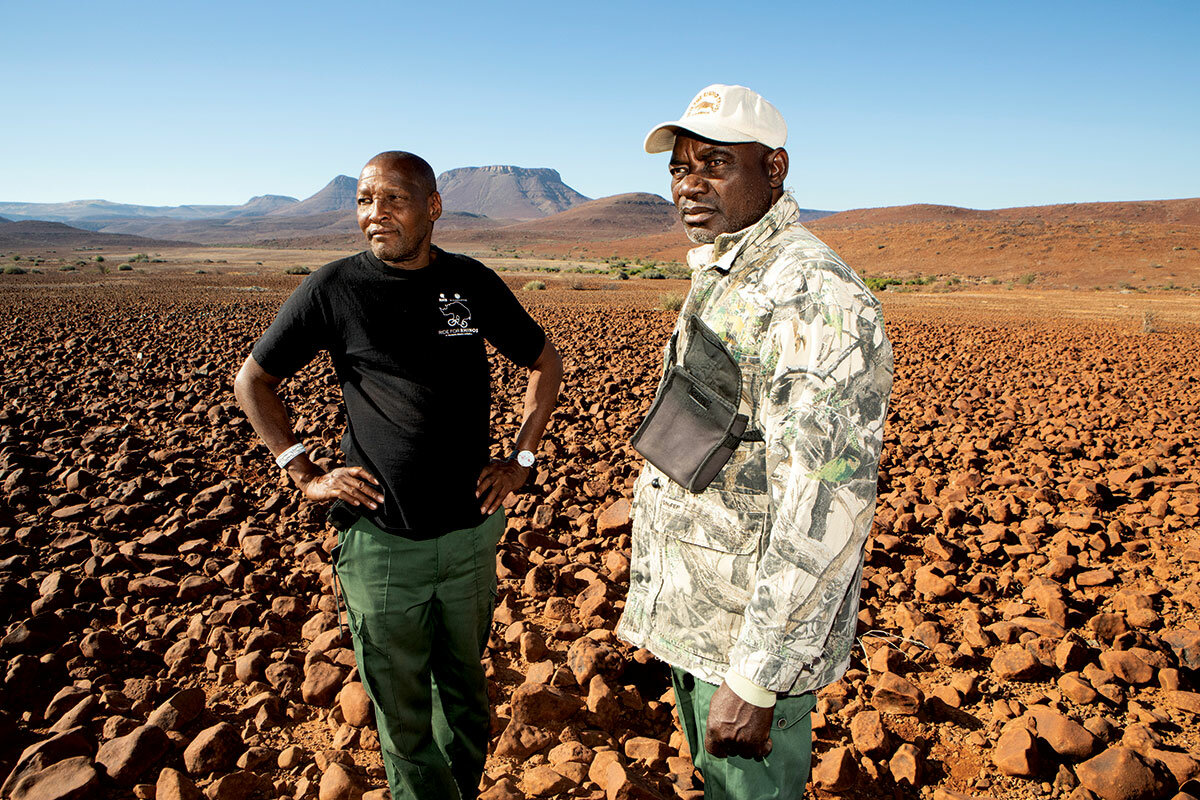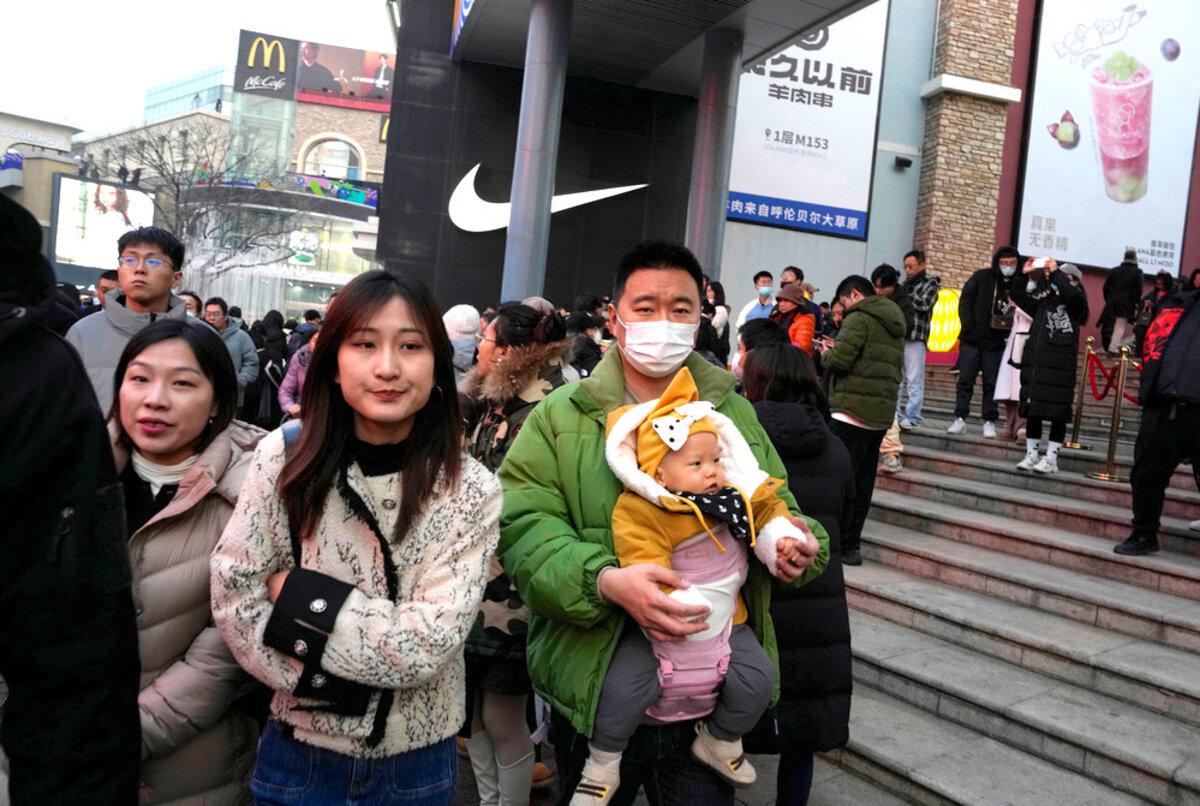While immigration compromise has long eluded lawmakers, a number of factors recently aligned to make a border security deal seem possible. But opposition from former President Donald Trump may halt the momentum.

Why is Christian Science in our name?
Our name is about honesty. The Monitor is owned by The Christian Science Church, and we’ve always been transparent about that.
The Church publishes the Monitor because it sees good journalism as vital to progress in the world. Since 1908, we’ve aimed “to injure no man, but to bless all mankind,” as our founder, Mary Baker Eddy, put it.
Here, you’ll find award-winning journalism not driven by commercial influences – a news organization that takes seriously its mission to uplift the world by seeking solutions and finding reasons for credible hope.
Explore values journalism About usMonitor Daily Podcast
- Follow us:
- Apple Podcasts
- Spotify
- RSS Feed
- Download
 Mark Sappenfield
Mark Sappenfield
Imagine if a mining company dug so deep that a town began to sink. And then imagine if the government’s solution was ... to move the city.
That’s Erika Page’s story today. She writes of pockets of frustration in Kiruna, Sweden, but mostly there has been an acceptance that this is for a greater good. I see something similar here in Germany – a deference to authority that is foreign to my American sensibilities. But it’s a reminder. There’s no one right way to solve problems. We can all learn from different perspectives – even when the ground is caving in.
Already a subscriber? Log in
Help fund Monitor journalism for $11/ month
Monitor journalism changes lives because we open that too-small box that most people think they live in. We believe news can and should expand a sense of identity and possibility beyond narrow conventional expectations.
Our work isn't possible without your support.
Today’s stories
And why we wrote them
( 6 min. read )
Today’s news briefs
• Alabama execution: Kenneth Eugene Smith is scheduled to be executed by nitrogen gas Jan. 25. The state claims this never-before-used execution method will be humane, but critics call it cruel and experimental.
• Ohio transgender bill: The Ohio Senate votes to override Gov. Mike DeWine’s veto of legislation banning gender-affirming care for minors.
• Former Trump adviser sentenced: Former U.S. President Donald Trump’s trade adviser Peter Navarro is sentenced to four months in prison for contempt of Congress.
• French farmers block roads: Farmers are blocking highways across France and dumping crates of foreign-grown vegetables as they pressure the government to protect them from cheap imports, rising costs, and environmental policies.
( 5 min. read )
The U.S. Supreme Court will make a historic ruling this year on whether the Constitution disqualifies Donald Trump from running for president. Ahead of the oral argument next month, the Monitor is previewing the most important questions in the unprecedented case. To read the first installment, click here.
( 5 min. read )
When an organization underwrites the needs of the many, how does it balance that against the needs of the few for whom it is directly responsible? That question is percolating in Kiruna, Sweden.
Patterns
( 4 min. read )
North Korean leader Kim Jong Un is stepping up his nuclear and missile tests, and his bellicose rhetoric. Could this be an opportunity for Beijing and Washington to work together on a common interest?
( 5 min. read )
This year’s Olympic Games will be held in one of France’s poorest communities. Residents are anxious to believe official promises that “Paris 2024” will leave them a brighter legacy.
Difference-maker
( 7 min. read )
As poaching soars across Namibia, one community hasn’t lost a rhino to poachers in three years. How’d they do it? By working with the community.
The Monitor's View
( 2 min. read )
When it was first reported last month, a minor new statistic on parenting in China hardly raised a shrug. The China Welfare Institute of Development Research Center found that the number of fathers in Shanghai serving as primary nighttime caregivers for their children rose by 5% since 2018. That starts from a low base. Nationwide, the amount of childcare provided by fathers is negligible.
Yet that modest shift in Shanghai may reflect a wider and quieter trend. Contrary to China’s decline in global surveys on gender equality in recent years, a paper published Thursday by two Chinese academics found that, within Chinese households, the reverse is happening. That insight is likely not to go unnoticed by officials in Beijing because its key driver is the target of state control: the internet.
Women “tend to have relatively lower bargaining power within their households, reflecting the established societal structure in China” with respect to owning property, managing household chores, and caring for children, the authors noted. “The use of the Internet significantly shapes women’s perceptions of gender roles, fostering a transition from traditional to egalitarian perspectives.”
The paper, published in the journal Humanities and Social Sciences Communications, assessed the role of the internet in building household bargaining power for women. Perhaps surprisingly, it found that the most significant change is taking place in rural areas, where gender roles are more likely to be shaped by long-standing community expectations and access to the internet is more likely to be hampered by poor infrastructure.
Despite such factors, rural women are finding community, job opportunities, new avenues to education, and access to feminist ideas that the government of leader Xi Jinping has sought hard to silence. “This surge in exposure directly correlates with increased participation in family matters,” the authors wrote.
The paper notes a correlation confirmed by experience in other countries – that more blending of masculine and feminine qualities by couples results in a higher degree of happiness, family stability, and social prosperity.
The Chinese leader stresses the need for “cyber sovereignty” and for other countries to respect “each country’s way of internet governance.” Yet Beijing’s stiffening regulations on digital content have not been able to stall a deepening of individual sovereignty among Chinese people, driving equality between women and men.
A Christian Science Perspective
Each weekday, the Monitor includes one clearly labeled religious article offering spiritual insight on contemporary issues, including the news. The publication – in its various forms – is produced for anyone who cares about the progress of the human endeavor around the world and seeks news reported with compassion, intelligence, and an essentially constructive lens. For many, that caring has religious roots. For many, it does not. The Monitor has always embraced both audiences. The Monitor is owned by a church – The First Church of Christ, Scientist, in Boston – whose founder was concerned with both the state of the world and the quality of available news.
( 4 min. read )
In learning that our foundation is divine Love, we find there’s no limit to the kindness and generosity we can share in our communities.
Viewfinder

A look ahead
Thank you for joining us today. Here’s our final reminder for the online event we’re holding tonight at 7 p.m. Eastern time. We’ll look deeper into our Climate Generation series, examining the lives of the young people leading the search for solutions to climate change. You can find the Facebook Live page here.










